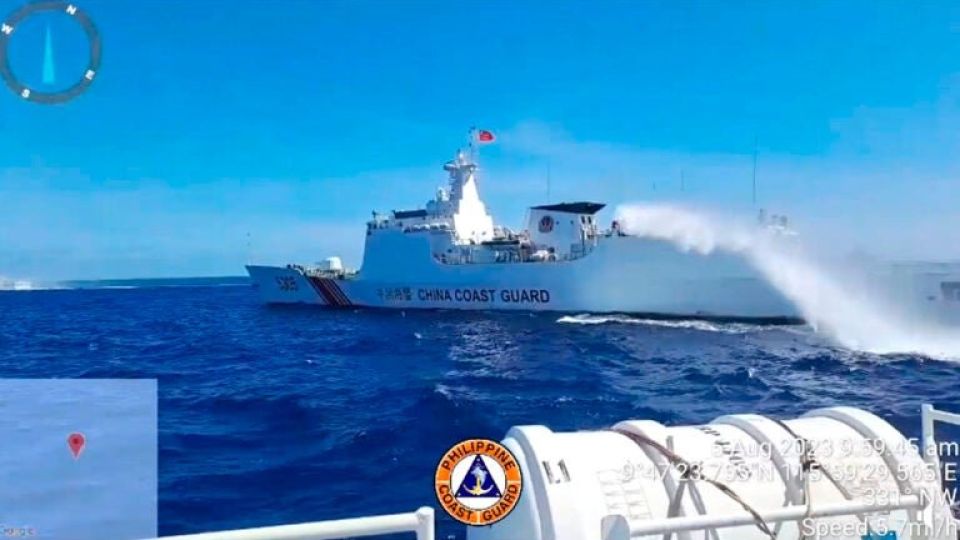August 14, 2023
MANILA, Philippines — China’s firing of water cannons at Philippine ships on a resupply mission to Ayungin (Second Thomas) Shoal has not only generated local and international interest but also stirred up nationalism among Filipinos, according to two political analysts.
Speaking at a news forum in Quezon City on Saturday, political science professors Renato de Castro of De La Salle University and Froilan Calilung of the University of Santo Tomas also said the Aug. 5 water cannonade incident should spur the government into boosting its defense capabilities while continuing to court the support of the international community.
Calilung said it was a “good thing” the Ayungin incident was widely publicized, as it drew a lot of attention, both domestically and internationally.
“It heightened the sense of nationalism among us and at the same time it brought [up] the issue [of] the international law again and we had countries rallying behind us. And I hope that this could be a very good or important flash point wherein we could begin more concerted efforts, especially in our dealings with other countries to support us,” he added.
De Castro said the government should be ready for China’s next moves to control the West Philippine Sea and other areas surrounding the islands being claimed by the Philippines.
“We should be prepared for this. What really [matters] there is we have to come [up with a] blueprint on how we can prepare the whole nation — it’s a whole nation approach. We have to build up the Armed Forces of the Philippines, we need to build up the Coast Guard,” he stressed.
“We have to basically convince every Filipino that they have to invest more when it comes to defense because that is really the issue,” De Castro also said, adding that to modernize the AFP and Philippine Coast Guard, the country must first have a stable economy and industries.
‘Maritime challenges’
He said credit must also go to President Marcos who, every time he speaks before the military, has been saying the AFP should likewise focus on geopolitical and external challenges, particularly in defending the country’s maritime jurisdictions.
“We have to tell the Filipino nation that the challenge will be long. It will be primarily maritime in nature and our goal is to ensure that the Philippines develops powerful maritime capabilities,” De Castro said.
“The Philippines is an archipelagic state. The Filipino nation is a maritime nation. The future of our country is, of course, developing our maritime capabilities and of course, harnessing our maritime resources,” he added.
For Calilung, exploring other mechanisms instead of resorting to force would serve the country’s interest in dealing with China.
‘Right now, international law and the international environment dictate that it’s better to pursue prospects for cooperation rather than tread the path going to war,” he said.
Calilung, on the other hand, pointed out that China may just be testing the country’s “resilience.”
“They know that we will be upset or annoyed but it will soon pass until the next incursion or the next provocation comes in,” he said.
Economic reliance
As for calls to boycott Chinese products to protest Beijing’s acts of aggression in the West Philippine Sea, Calilung said: “To be honest, I think it will do more harm than good, but at least there’s the sentiment that we’re showing here; it’s the nationalistic sentiment at the very least.”
He agreed with De Castro that the country should also enhance its capabilities and ease its economic reliance on China, adding: “We’ve been talking about military modernization and I think it’s not just about that. What’s difficult here is we are fighting, what we want is direct confrontation, but we also depend on them [economically] at the same time.”
Chinese Foreign Minister Wang Yi, meanwhile, urged Manila to work with Beijing to find an effective way to defuse tensions in the South China Sea, the official Xinhua news agency reported on Saturday.
Wang’s remarks were made during his visit to Singapore and Malaysia on Thursday and Friday, according to Xinhua.
He was reported as saying that Beijing has reiterated its willingness to resolve differences and has expressed hope that Manila would abide by a consensus as in the past.


